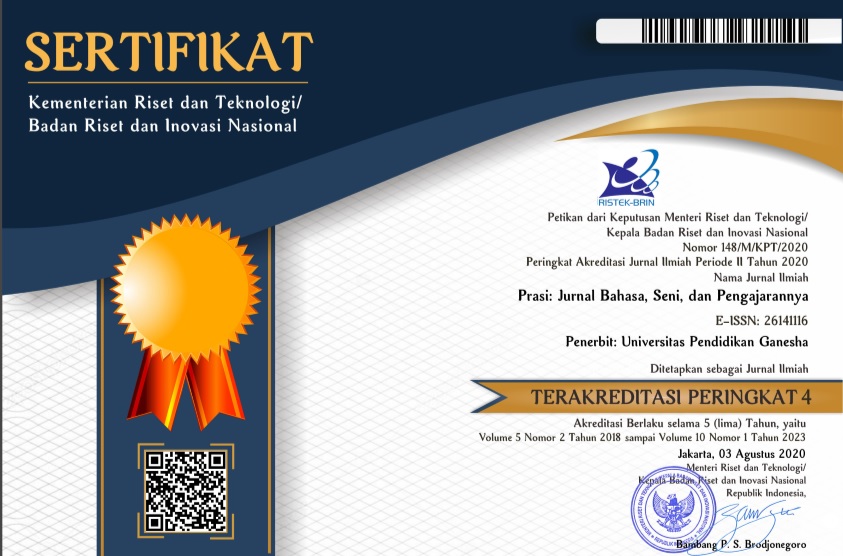KAJIAN AKUSTIK BUNYI FRIKATIF OLEH MAHASISWA SEMESTER II JURUSAN BAHASA INGGRIS DIPLOMA III
DOI:
https://doi.org/10.23887/prasi.v10i20.8914Abstract
There are some English sounds that Indonesian language doesn’t have. Concequently, some sounds are difficult to pronounce by Indonesian learning English. This research was aimed at analyzing the acoustic characteristic of English fricative sounds produced by the second semester students of D3 English Department in order to reveal the difficult sounds of English fricative clearly. Qualitative design was used in examining the acoustic characteristic of the sounds. The data were gathered by recording the sounds produced by fifteen subjects. The data were analyzed using the figures of oscillogram and spectogram shown by the speech analyzer. Based on the result of data analysis, it is shown that there are five dificult fricative consonants for the second semester students of D3 English Department. Those consonants are the final [v] , the final and middle [θ], the initial and final [ð], the final [z], and the initial [ʃ]. The results of the research also show that the students tend to change the sounds with other sounds which will result the change of meaning of the words.
Key words: fonetik, acoustic, english, speech analyzer
Downloads
Published
Issue
Section
License
Authors who publish with Prasi agree to the following terms:- Authors retain copyright and grant the journal the right of first publication with the work simultaneously licensed under a Creative Commons Attribution License (CC BY-SA 4.0) that allows others to share the work with an acknowledgment of the work's authorship and initial publication in this journal
- Authors are able to enter into separate, additional contractual arrangements for the non-exclusive distribution of the journal's published version of the work (e.g., post it to an institutional repository or publish it in a book), with an acknowledgment of its initial publication in this journal.
- Authors are permitted and encouraged to post their work online (e.g., in institutional repositories or on their website) prior to and during the submission process, as it can lead to productive exchanges, as well as earlier and greater citation of published work. (See The Effect of Open Access)


.png)
.png)









